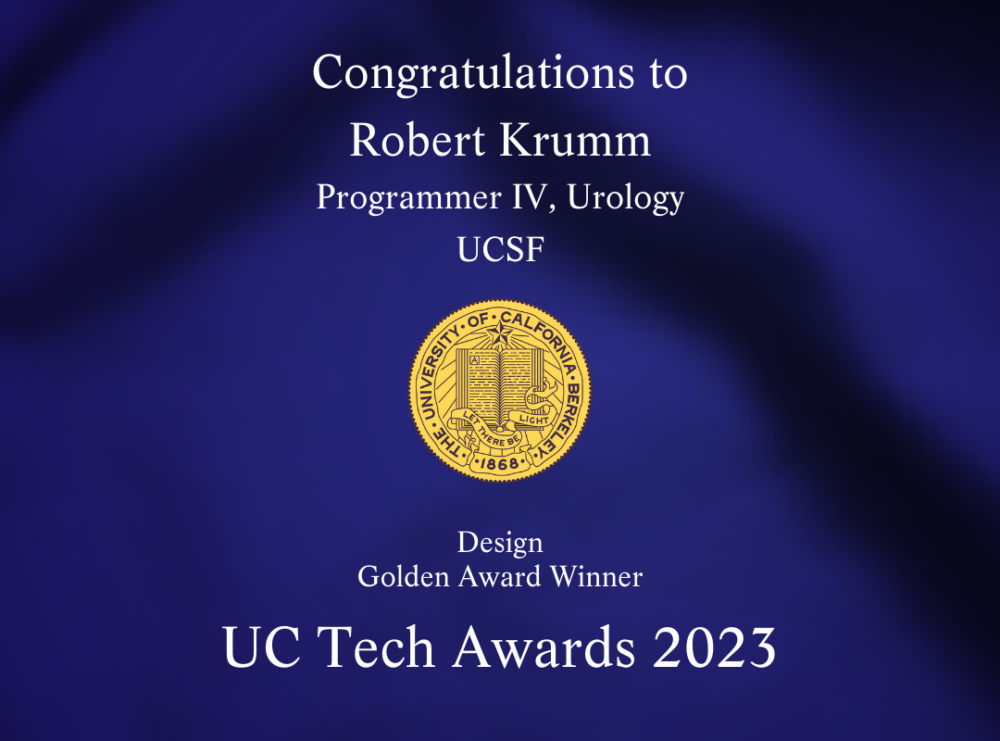This year, Robert Krumm, database developer, UCSF, won the UC Tech Design golden award, thanks to his work with the Urology Oncology Research Database and Biobank Project Teams. Learn more about his work with UCSF urology research teams, including data scientists and surgeons, based on this excerpt from his UC Tech 2023 Awards Program application.
Summary
Despite huge advances in both open-source (R-studio) and commercially available analytics (Tableau) their use in medical research is impeded by the shortage of “analyzable” data. Electronic Health Records (EHR) systems like Epic model the patient chart model which collects all available data into a folder that requires inspection to determine the course of treatment, lab results, pathology reports, and physician notes as created. The Urology Oncology Research Database (UODB) project is designed to extract, transform and connect unstructured data sources into a fully relational data lake with a suite of web-based apps and compatible with any analytics suites.
Project Description
In recent years, the tech world has provided a variety of remarkable data analytical tools from open-source environments like R studio to commercial products like Tableau which allow professionals like the tech literate faculty of UCSF to directly perform sophisticated statistical analysis, thus eliminating layers of friction in the research process. But all of this requires “analyzable” data that is highly structured. A fully integrated database that can produce the X and Y variables is the prerequisite for any sophisticated bioinformatic research. The UODB project is a standard Structured Query Language (SQL) relational database with a single page style web User Interface (UI) that provides an end-to-end research environment. It services all members of the community by contributing to, and extracting from, a single data source, all of the data needed to support a new level of bioinformatics. The UODB consumes data from a wide variety of sources, then converts, transforms and extracts highly structured relational data. It allows direct connection between bioinformatics and biobank specimens so that given a set of research criteria it can determine what slides or images are available for the study. The level of integration allows for application that have not been possible before. One area is “rule” based concepts that allow for basic statistics, e.g., “how many prostate cancer patients have we treated in the last decade?” that current medical records cannot answer. The potential is unlimited.
Project complexity, impact, and mission alignment
- Complexity: ERM model of patient-centered, procedural event sequence was replaced with a fully relational object model where the ERM model structure are converted to attributes of data concept objects. ERM concept-specific table/list model is replaced with a simple object model: object => Date/Time attribute, Patient attribute, Event attribute, Concept attribute, Measurement attribute SQL/relation principle used to virtualize tables/Lists for backward compatibility.
- Impact: The evolving apps now cover all of the domains of the research model that previously used disconnected data sources.
- Mission Alignment: The project succeeded in using a single data source for all the tasks that require data support. Once created tasks that were not possible prior to their creation are now the basis of key research work. The extensible property of the data model allowed it you take on new, novel tasks not envisioned at the time of design. For example, the Biobank structure was extended from physical specimens to images of specimens created with Super HD scanners still totally integrated with all conceptually related data elements – e.g., provide the surgeon who performed the procedure from which the slide was created that was used to create the image in the inventory.
UCSF Urology, Oncology project team members
- Robert Krumm, Database developer
- Jonathan Albright, Research database programmer
- Janet Cowan, Manager, UCATS Stats Group
- Karen Lopez-Acero, Assistant clinical professor
- Imelda Tenggara, Director of Research Resource
- Anobel Odisho, MD, Associate professor
- Matthew Cooperberg, MD, Professor
- Sanika Mane, Clinical research coordinator
UC Tech 2023 Awards Program Background Information
The UC Tech Awards Program celebrates individuals and teams in the UC tech community who have contributed in areas of strategic importance to the university using technical approaches. The UC CIO Council created the program in 2001 when an award for innovation was named after Larry L. Sautter. The program has grown to seven awards, which includes design, DEI leadership, innovation, IT Security, operational excellence, UC-wide collaboration and sustained impact. The UC Tech Awards Program celebrates those designing or implementing high-impact technology initiatives. It promotes an inclusive UC tech community by recognizing the technology contributions of people from all areas of expertise, including business operations, research, education, patient care and public service. The UC Tech Awards are sponsored by the UC CIO Council, composed of the Chief Information Officers (CIOs) across UC locations. Each year, five members of this council, who rotate on an annual basis, select the awards winners. The annual call for submissions is announced in February with an April submission deadline. The committee meets by early June and awards are presented at the annual UC Tech Conference. To learn about the UC Tech Awards program, please visit the UC Tech Awards Program Description or contact Laurel.Skurko@UCOP.edu.
Join webinar with Krumm on November 8th
Webinar: Robert Krumm – Coding and Database Design for Enduring Relevance [Zoom Link]
Wednesday, November 8, 3-4 p.m.
Host: UC Office of the President
Learning objectives: Learn how Krumm combines retail industry techniques in coding and database design to support the world’s leading urology surgeons. He will explain his methods of collecting, storing and connecting data with a complete understanding of how that data will be used.
Contact

Database developer
UCSF
[Caption/AltText: UC Tech Awards 2023 Golden Award for Design – Robert Krumm, UCSF]

